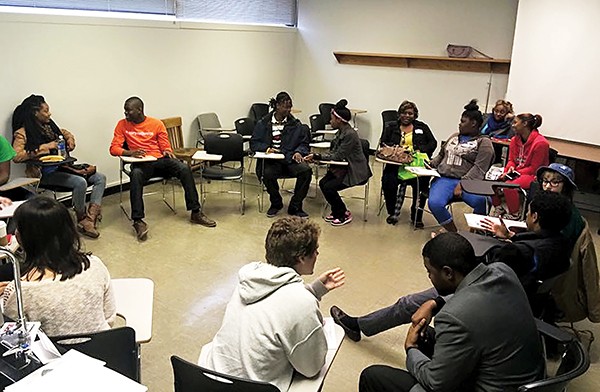The Juvenile Court of Memphis and Shelby County (JCMSC) has been under scrutiny in recent years, following findings of racial discrimination and other problems in a 2012 investigation of the court by the United States Department of Justice (DOJ).
Last weekend, a group of about 40 young people ranging from 13 to 18 gathered at LeMoyne-Owen College to discuss issues surrounding juvenile justice reform.
Some of them were concerned teens; others had court-ordered community service. But by the end of the day, the People’s Conference on Juvenile Justice brought forth a wave of youth-facilitated discussion — full of opinions, suggestions, and complaints.

LeMoyne-Owen College.
The conference, a joint effort by Memphis United and BRIDGES, was designed not only to give a platform for these discussions but to give young people the nudge they needed to mobilize in favor of reducing youth crime and negative depictions of teenagers in media, said Bradley Watkins, the executive director of the Mid-South Peace and Justice Center.
“When we set off doing this event, we wanted to make sure that, as much as possible, it was youth-facilitated, youth-led, and youth-crafted,” Watkins said. “We say, ‘Youth are the solution, not the problem,’ but we never allow them to be a part of the solution. The fact that adults weren’t really engaging in that conversation — that it was more youth with youth — the conversation was more fruitful.”
Youth leadership program members from Bridge Builders and other young people led workshops, which included a “Know Your Rights” training seminar that set out to educate attendees about the rights they are guaranteed despite being below the voting age.
In the 2012 DOJ report, the department found that the JCMSC failed to provide adequate protection for juveniles in regard to self-incrimination, in particular “[advising] juveniles of their Miranda rights prior to questioning” in probation conferences. That report also found the JCMSC failed to “provide constitutionally required due process to children of all races” on top of charges of administration discrimination against black children and unsafe conditions while in confinement.
Since then, the DOJ and the JCMSC came to an agreement in terms of reformation, providing timelines and goals in order to reduce the presence of black juveniles within the system in Shelby County as well as “ensuring greater equality for all youth,” according to compliance reports.
In 2014, those reports reiterated a “minority youth over-representation at almost every stage in the proceedings and evidence of discriminatory treatment of black youth.” With the JCMSC’s progress so far, the community outreach branch of the court has worked with BRIDGES and Memphis United to change the conversation from punishment to prevention.
“I worked for a juvenile detention facility 16 years ago,” Watkins said. “I was working there, all those years, thinking I was a counselor until I realized, ‘This is just a private jail.’ This model that we have for our juvenile justice system doesn’t incentivize reforming or ending recidivism. It profits off the recidivism because most of the juvenile detention centers make their money based on how many bunks they fill each night, not how many kids leave their program and never engage with the criminal justice system again.”
BRIDGES and Memphis United are planning a second conference to take place in late August at LeMoyne-Owen College.